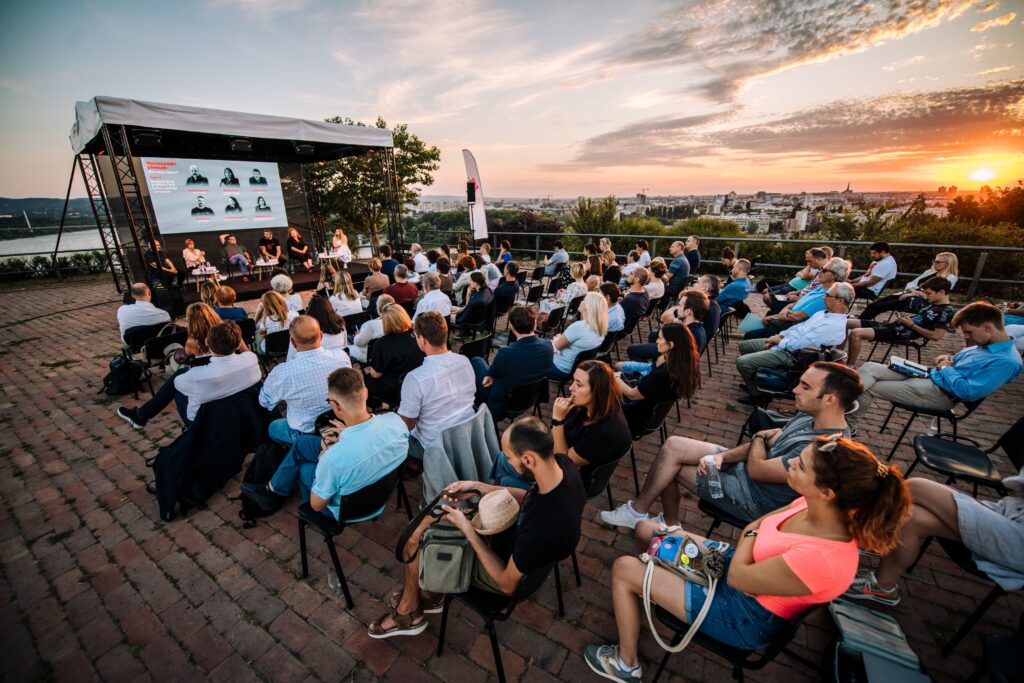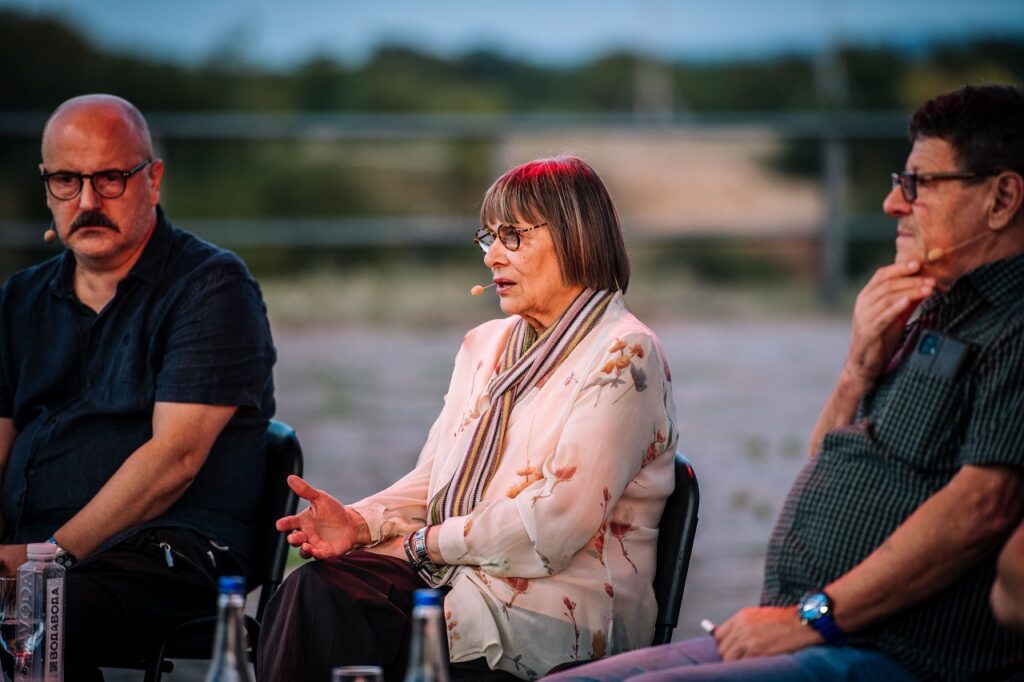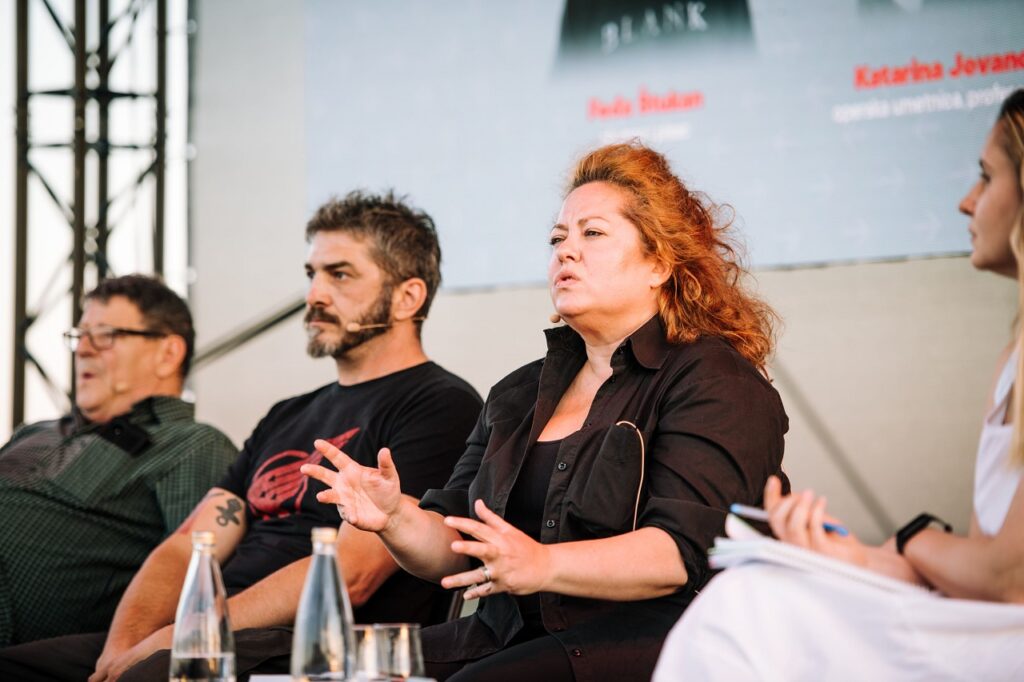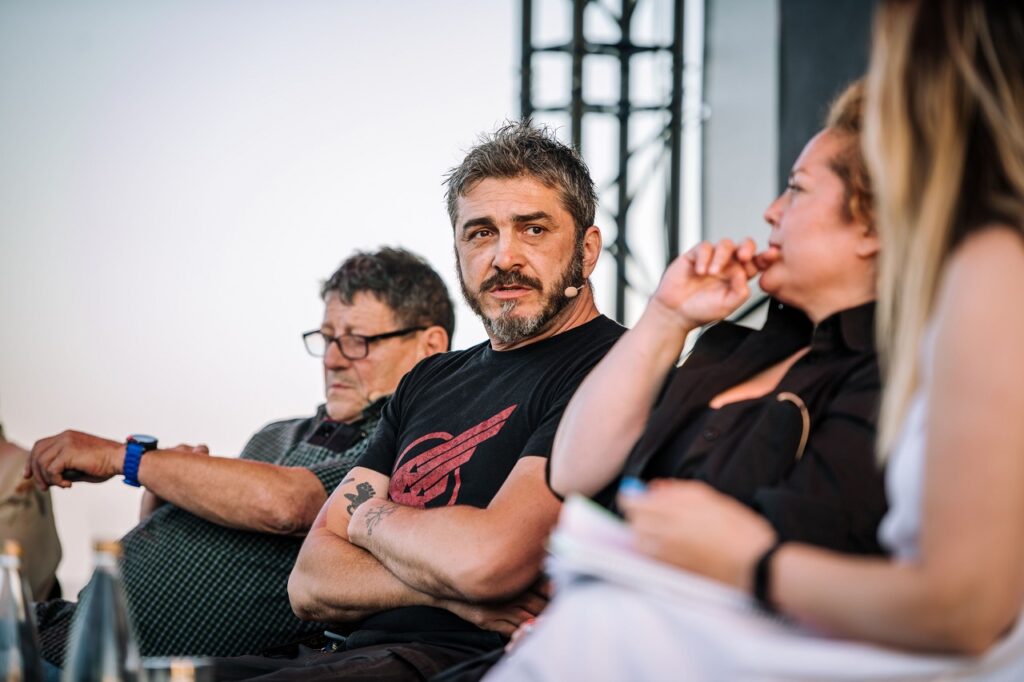How important art is for the culture of remembrance, and how important it is to draw attention to key social issues through art, which includes remembering the victims, was discussed at the closing panel “Dealing with the past through the culture of remembrance and art” of the Novi Sad Plenum QUO VADIS BALKAN?, organized by the Regional Academy for Democratic Development (ADD), Centre for Civic Education (CCE) and the European Fund for the Balkans (EFB).
The discussion was moderated by Aleksandra Jerkov, the founder of ADD, who stated that they considered it necessary to organize a discussion about the culture of remembrance, about the role that culture and art play in the process of reconciliation in the region and in dealing with the past right this year, when Novi Sad hold the title of European Capital of Culture.
“We cannot say that we are in the city of culture without mentioning and ignoring the fact that our townswoman was chosen as best European actress this year. Jasna Đuričić received the most prestigious awards in Europe at many festivals, but Novi Sad in no way acknowledged that fact, nor did it respect her work. And while she receives the most prestigious international awards, she remains completely unacknowledged in her city, as well as all her achievements,” explained Jerkov.
Director Kokan Mladenović talked about what it is like to be an artist exiled from the hometown, as more than twenty of his plays are played in cities in the region, and he works the least in Belgrade.
“In the last ten years, I have directed only twice in Belgrade. But one gets used to it somehow. They forced me to go to better places, and one gets used to better things easily. Losing contact with loved ones during those refugee theater days was not the most pleasant. However, the other sort of pay is much more terrible. That is the price of compromise with those who make up the current life of the theatre in Belgrade and who constitute the current government at the level of ministries and others. If we make pacts with them – and many of our respectable and successful colleagues have switched to that dark side, we have no peace. They went to Voldemort himself to get some more privileges in their mature years. This defines us in the long term, and that is why I think it is better to live our refugee theatre life and look at ourselves in the mirror as we should, rather than sell ourselves easily for their funds and competitions”, said Mladenović.
He also reflected on the treatment of the film “Quo Vadis Aida?” in Serbia.
“The treatment of the film “Quo Vadis Aida?”, not only in Novi Sad, but also in Serbia, is shameful. The other day, residents of this country could watch that film on HRT 2, and that is the closest we have come to it. It only shows the complete unconsciousness of those who lead the culture and the state regarding what is really valuable, which cemented turn into the 90s because in our government are accomplices in war crimes from that time. It is illusory to expect with all those like Vučić, Dačić and others, with that camarilla that is identical to those from the 90s, that they will suddenly be fighters for democracy, that they will make reconciliation in the region, that they will be eager for the truth about that period because the truth about the 90s is the last thing they want,” Mladenović assessed.
The founder of the Humanitarian Law Center, Nataša Kandić, who has been working on a list of all war victims by name and surname for decades, in order to find out the truth about each crime, believes that “the problem is that we have a “politics of remembrance” in our society – not a “culture of remembrance”.
“Exactly the example of the film “Quo Vadis Aida?” demonstrates how a very valuable work of art, such a good film, cannot be part of the culture of remembrance at this moment. The situation is similar to many other films and works of art. I will remind you of the film “Grbavica: The Land of My Dreams”, which was perceived as a betrayal in Serbia. The film “Hive”, by Kosovar director Blerta Basholli, was also in the race for the “Oscar”, but there was no space in Belgrade where it could be screened. That film outgrows Kosovo itself, the very area where so many crimes and victims took place in just 78 days. The director leaves that level of crimes and their perpetrators, and talks about the beginning of a new life, she talks about a woman from a village where a large number of men were killed. That woman becomes the leader of a new beginning even though she lives in a very conservative society. She has the strength to feel the need to put the past aside and move on in life, for the sake of the children and their future. The director, therefore, goes beyond that ethnic level, creates something very strong and powerful, but even that cannot be accepted in Serbia”, said Kandić, pointing to the fact that even art cannot overcome the obstacles set by society.
Kandić, who did a lot to build a culture of remembrance and who was not afraid to raise those painful topics, believes that the main obstacles are the strong politics of remembrance.
“Over the last few years, the situation in Serbia has been even more difficult, complicated and hopeless. Remembrance policies are the official model. Politics implements the official strategy of what, how and in what manner things should be remembered. That strategy has become dominant, and no rebellion helps. No instrument can break through those obstacles set up by the highest institutional levels. That is how strong they are”, Kandić pointed out.
However, she considers that no matter how complicated everything is, one should not give up. “I deeply believe that if all the victims were listed, that ethno-nationalist approach would be reduced and then, things would be easier for art, culture and civic activism. This is the only way to defeat those official strategies of politics of remembrance and to have a culture of remembrance”, she concluded.
Opera singer Katarina Jovanović shared her experience about the knowledge of young people today about our recent past since, in addition to practicing art, she also works as a pedagogue, and a professor at the Faculty of Music in Belgrade.
“When young people come to the Academy, it is already too late for them – their brains are already on a certain path. It is difficult to bring them back from that path, because if a young man does not have a capacity for curiosity or knowledge, especially if they are artists, he has already built awareness in another direction. The artist is the one within us who has to look for what is being said under the breath. There are loud things, but you go to listen to the quiet ones”, she states.
“In our country, nationalism and professional patriotism are so loud, and these are things that have nothing in common with art. There also lies the answer to the question that is always asked in July, on the days of commemoration of the genocide in Srebrenica… We are like fish on dry land struggling in a civilization that is in complete collapse. And the fact that you can not even assess the value of a work of art, such as the film “Quo vadis, Aida?”, fits into this. Ignoring a work of art is a feature of every totalitarian association, and we are in one of those in Serbia. How is this totalitarianism strengthened? By manipulating the data. It is very clear why the victims are not counted because that is how they can be manipulated in the centuries ahead. This is how textbooks can be rewritten,” said Jovanović.
“All this leads to the fact that a young man who comes at the age of 18 with the desire to engage in classical singing or artistic music, is fully formed in his narrative that is almost exclusively Orthodox and insufficiently educated in foreign languages. They come to the Academy with less and less knowledge of foreign languages because “speak Serbian so that the whole world can understand you”. It is a joke, but a joke that has sharp teeth. As a professor, I don’t have much hope that something will get better, since our education is so backward that it does not recognize the magnitude of the artwork”, elaborated Jovanović.
“The copyright for the murals of Ratko Mladić should be attributed to Boris Tadić and Vojislav Koštunica, that is always somewhere in the shadows,” said the writer Svetislav Basara, who considers “that Milošević, Koštunica and Tadić belong to the same political structure.”
“There is an anomaly called Vučić. He simply happened because of the bad judgment of the Cincar Belgrade bazaar, which has been raging for 200-odd years. All the evils that were committed here were supported by both the church and the state. Radomir Konstantinović was the first to question it. Unfortunately, some things cannot be proven, but 80 percent of people will tell you that the actions of Ratko Mladić in Srebrenica were good. Of those 80 percent, most will not admit it publicly, but 25 percent will say it publicly. It is our legacy of the past deeply rooted. Hence the narrative that the borders of the Serbian state should be where the last Serbian grave is. If someone here wants to engage in politics, s/he must tell those stories that will find allies in those 80 percent of people. Everyone, except for really rare individuals and some organizations, are deeply involved in that story, which has been dominant in our country for two centuries,” said Basara.
On the panel, the guest was the actor and writer from Sarajevo, Feđa Štukan, whose novel “Blank” had several editions in a short period of time, and in which he described his life experience, including voluntarily going to war but also escaping from the army by trick.
“Very young, at the age of 18, I went voluntarily into the army. But then I started asking questions. A person matures when s/he starts asking questions. And my first question was: How come I have a rifle made in Serbia in my hands but I am fighting against them? That was followed by questions about how it is possible that there is so much religion and fierceness on that side among the soldiers, and why food from humanitarian aid is resold on the market, wondering where the various donations end up…”, Štukan evoked memories.
“On reflection, a man can conclude that it is not really his war and that he should not be in the trenches defending himself. I managed to deceive them that I am crazy”, said Feđa Štukan.
He also shared with the audience the story of how the book was published, and now is widely read in the region, that is, he told the story about the promise to a friend who insisted on it after reading the manuscript.
With this panel, the Novi Sad Plenum was completed at the crowded Petrovaradin Fortress.




